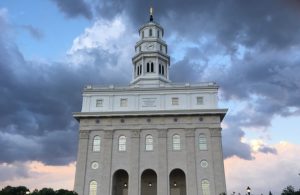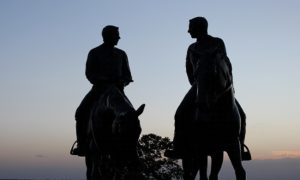 Until this past year, I don’t think I’d ever heard of Occam’s Razor. I feel like I should have known what it was, but I didn’t. So, for anyone else who isn’t familiar with it, let me begin with some background. William of Occam (or Ockham) was a 14th century Franciscan friar and philosopher who lived in Ockham, England. He is best known for a principle that states that “Among competing hypotheses, the one with the fewest assumptions should be selected” or in easier terms “If there is more than one way to explain something, the simpler one is usually right“. It’s called a razor because it is all about shaving off the unnecessary, and it seems to be a big deal in science.
Until this past year, I don’t think I’d ever heard of Occam’s Razor. I feel like I should have known what it was, but I didn’t. So, for anyone else who isn’t familiar with it, let me begin with some background. William of Occam (or Ockham) was a 14th century Franciscan friar and philosopher who lived in Ockham, England. He is best known for a principle that states that “Among competing hypotheses, the one with the fewest assumptions should be selected” or in easier terms “If there is more than one way to explain something, the simpler one is usually right“. It’s called a razor because it is all about shaving off the unnecessary, and it seems to be a big deal in science.
It also seems pretty popular among the critics of The Church of Jesus Christ of Latter-day Saints because it tends to favor that which can be experienced with our five senses and which can be easily measured. I recently read a couple of examples that may be helpful. First, let’s imagine that there was a strong wind last night and we have discovered that two trees have been downed. One theory holds that the two trees where each struck by separate meteors at the same time, after which the meteors crashed into each other, completely obliterating any signs of their existence. A second theory, which suggests that the trees blew down, is much simpler and probably correct.
The second example is that of children being left alone with cookies. The mother returns and finds that the cookies are gone. The children claim that they were taken by leprechauns, who snuck in through magic portal and have since disappeared. Occum’s razor favors the proposal that the children simply ate the cookies, because it doesn’t require us to believe in leprechauns or magic portals.
Now let’s use Occum’s razor as we ask the question, “Where did The Book of Mormon come from?” One assertion holds that early inhabitants of the Americas wrote their record on gold plates, and then buried them underground, where they sat undisturbed for over a thousand years. Later, one of these ancient scribes, Moroni, returns as an angel to lead an obscure farm boy, Joseph Smith, to their location. Moroni, not only gives Joseph the plates, but conveniently gives him interpreters to translate them into English. Of course, only a few people are allowed to see the plates, and once the translation is finished, they are returned to the earth, never to be discovered again. The second idea is that Joseph Smith—alone or with help—makes up or plagiarizes the text along with the wild story of its origins. The second theory is certainly the simpler of the two and the obvious Occum favorite.
Given this, why do so many otherwise intelligent people choose to believe the plates and angel version? I have a few ideas. First, I believe in a powerful sixth sense, which allows us to communicate with a higher power. This is hard to explain, describe, or measure, and is therefore discounted by some as unreliable, delusory, or foolish. One of the first tactics used by those who would discredit faith and testimony is to suggest that we should stick with things we can see, hear, touch, and measure. Imagine trying to explain a beautiful sunset if you can’t bring sight into it, music without considering sound, or chocolate deprived of taste. In a similar way, we can’t adequately explain or evaluate religious things minus manifestations of the spirit.
Nearly everyone accepts things they can’t see or fully explain. I am certain about the existence of gravity because I experience its effects. I can’t see electricity, but I can use it to my advantage. Scientists agree that the majority of the universe is made up of dark matter, but they are unable to explain its properties. Keep in mind that while Occum’s razor is a beneficial guiding principle in some settings, it isn’t always the best way to arrive at the truth.
 Another thing to consider is the questions we are asking. In the question above the simplest answer is that Joseph Smith is a fraud, but what about the question, “Why have so many people become converted to the LDS Church after reading The Book of Mormon?” Millions of people have testified that they received a divine witness of this book, but they have done more than witness. Many have completely transformed their lives, others have sacrificed everything. Last week I was in Nauvoo and was impressed with the dedication and sacrifices of the early saints. Some try to attribute the Latter-day Saint movement to the charismatic leadership of Joseph Smith, but most early converts were first introduced to The Book of Mormon. Their testimony of its truth led them to leave their homes and immigrate to be with the saints, never having met Joseph Smith. Thousands of others came even after his martyrdom, and it continues today as people with vastly differing backgrounds embrace the message of The Book of Mormon.
Another thing to consider is the questions we are asking. In the question above the simplest answer is that Joseph Smith is a fraud, but what about the question, “Why have so many people become converted to the LDS Church after reading The Book of Mormon?” Millions of people have testified that they received a divine witness of this book, but they have done more than witness. Many have completely transformed their lives, others have sacrificed everything. Last week I was in Nauvoo and was impressed with the dedication and sacrifices of the early saints. Some try to attribute the Latter-day Saint movement to the charismatic leadership of Joseph Smith, but most early converts were first introduced to The Book of Mormon. Their testimony of its truth led them to leave their homes and immigrate to be with the saints, never having met Joseph Smith. Thousands of others came even after his martyrdom, and it continues today as people with vastly differing backgrounds embrace the message of The Book of Mormon.
It seems far-fetched to suggest that devotion to the charismatic personality of Joseph Smith somehow transferred to Brigham Young, who had such a different style, or to the fourteen succeeding prophets, some of which don’t seem to me to be particularly electrifying.
The suggestion that Joseph Smith was some sort of writing savant also seems unlikely since he doesn’t seem to have written anything of note before producing a complex book that in its current edition is over 500 pages when he was only about twenty-five years old. None of those closest to him—wife, family, or friends—suggest or even agree that he was a genius. By contrast, there are numerous firsthand accounts of those whose witnessed the process of the coming forth of The Book of Mormon, all of which agree that Joseph dictated rather authored the book. Those who knew him best believed his prophetic claims.
The idea that Oliver Cowdery, who was at least a more educated school teacher, was the co-author of the book is also unlikely. Cowdery, himself, never made this claim, even after a falling out with Joseph Smith, or during the long period of estrangement from the church after his excommunication. He never claimed to be more than a scribe, and he stood as a witness of the gold plates. It seems that giving authorship credit to Cowdery is simply an attempt to make the “Joseph just made it up argument” less unbelievable.
As we change the question being asked from “Where did The Book of Mormon come from?” to “How do we explain its influence?” the use of Occum’s razor also changes. The simplest answer to the second question seems to be that there really is something powerful in The Book of Mormon, which comes from God and witnesses of His existence.
A testimony of the gospel requires a belief in things that can’t always be seen or measured, an acceptance of angels, and miracles. It requires faith. While maybe not all that scientific, The Book of Mormon itself suggests that we run an experiment, by reading, praying, and putting its principles into action. I find goodness, strength, and guidance in its pages, and I believe.
Recent Comments